Divided Legacy
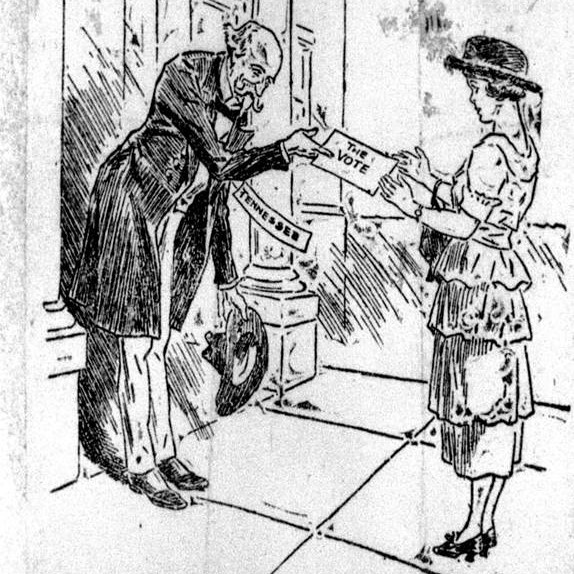
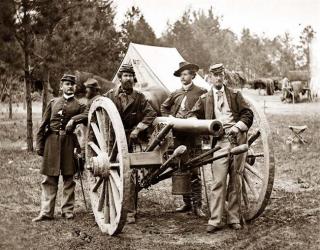
That the Civil War had a profound impact on southern women is well known. Less well known is that this great conflict continued to affect the public debate over the role of women long after the shooting stopped.
As the South confronted the so-called “woman question” in the late nineteenth and early twentieth centuries, the most bitterly contested issue was woman suffrage. Partisans on both sides of the debate made extensive use of Civil War rhetoric and references in their efforts to influence public opinion and policy. White southerners, whether for or against expanding the role of women, frequently invoked ‘the War” or “the Lost Cause” to support their positions. Suffragists and anti-suffragists alike spoke reverently of the Confederacy and of Confederate heroes and heroines, and both sides claimed that their positions were in harmony with traditional southern values.
When the Civil War ended, women’s rights advocates in the Northeast renewed their activism. By 1869 they had established two national suffrage associations, both intent on gaining female enfranchisement. That same year the territory of Wyoming led the nation in enfranchising women, in part to attract more women settlers. Utah soon followed, also acting in part from practical considerations; territorial leaders were battling Congress over polygamy and hoped to show that, despite plural marriage, Mormon women were not downtrodden. However, in southern states, enmeshed in the bitter conflicts of Reconstruction, there was scant support for woman suffrage: as a movement with roots in the antislavery movement, it was scorned by most white southerners. To them the fact that the suffrage movement was endorsed by a few “carpetbaggers” including Anna Whitehead Bodeker of Virginia and the relatives of a prominent African American state legislator in South Carolina, the Rollin Sisters, did little to enhance its image.
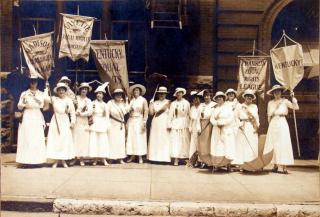
In the postwar South, white conservatives were deeply resentful of the social and political innovations imposed during Reconstruction and concerned about the potential impact of the industrialization and urbanization urged upon them by advocates of a “New South.” They opposed changes they saw as threats to southern values, key to what they still believed was a superior “Southern Civilization.”
Unfortunately for the cause of woman suffrage, the commitment to preserving the traditional role of southern womanhood was an integral part of this intense, quasi-religious drive to protect the South against the “ravages” of northern culture. Conscious that the war had disrupted the traditional division of labor and forced many white women out of the domestic sphere—even to work for wages— southern conservatives were eager to restore them to their traditional domestic sphere, well removed from public affairs. They watched uneasily as growing numbers of women sought higher education, in many cases so that they could support themselves by teaching, and became involved in voluntary associations including the Woman’s Christian Temperance Union (WCTU).
By the 1890s their fears materialized. A small but determined group of “respectable,” middle- or upper-class, white southern women led by Laura Clay of Kentucky committed themselves to the cause of woman suffrage and began to work with national leaders of the suffrage movement to “bring in the South.” In their public statements promoting woman suffrage they insisted that the expansion of woman’s role—even into politics—was a natural extension of woman’s sphere made necessary by changing times. Indeed, as they described it, women’s new public activism was directly traceable to the Civil War.
Most white southerners, however, favored the position of antisuffragists that while the traditional role of the Southern Lady precluded her direct participation in politics, her indirect, inspirational role was indispensable—a source of pride and distinction for the South. In addition, protection of white womanhood was a key element of white southern mens’ rationale for disfranchising black men they claimed would be inspired by political equality to aspire to social equality. When it appeared that southern suffragists could win the vote only by federal action and sought support for a woman suffrage amendment, evocation of Civil War references and rhetoric only increased. Politicians who had only recently adopted new policies to reverse the effect of the Fifteenth Amendment insisted that ratification of what became the Nineteenth Amendment was unthinkable. It was, they proclaimed, another federal assault on states’ rights—the fundamental principle, for which Confederates had fought and died during the Civil war. Any “true” son or daughter of the South, they insisted, would recognize that fact.
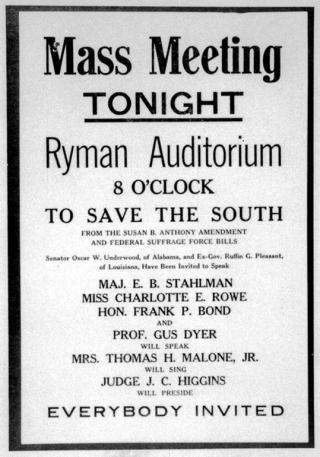
Thus, despite the best efforts of southern suffragists to present their movement as compatible with southern values, they had scant success. Prior to the ratification of the Nineteenth Amendment in 1920, women gained full enfranchisement in no southern state and partial suffrage in only four. Moreover, of the ten states that failed to ratify the Nineteenth Amendment, nine were south of the Mason-Dixon line.South. In addition, protection of white womanhood was a key element of white southern mens’ rationale for disfranchising black men they claimed would be inspired by political equality to aspire to social equality. When it appeared that southern suffragists could win the vote only by federal action and sought support for a woman suffrage amendment, evocation of Civil War references and rhetoric only increased. Politicians who had only recently adopted new policies to reverse the effect of the Fifteenth Amendment insisted that ratification of what became the Nineteenth Amendment was unthinkable. It was, they proclaimed, another federal assault on states’ rights—the fundamental principle, for which Confederates had fought and died during the Civil war. Any “true” son or daughter of the South, they insisted, would recognize that fact.
Yet the Nineteenth Amendment could not have been ratified without the cooperation of at least a few southern states. Four states—Texas, Arkansas, Kentucky, and Tennessee—broke rank with the otherwise “Solid South.” And ironically it was a southern state that became the crucial thirty-sixth state to ratify, providing the three-fourths majority required for woman suffrage to be added to the Constitution.
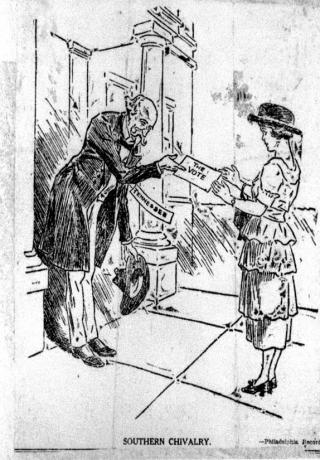
After the amendment was finally approved by Congress in 1919 and sent to the states for ratification, many states ratified quickly but fierce battles for the remaining states ensued. By the summer of 1920, with only one more state needed and none set to consider the amendment before the November presidential election, Tennessee held a special session to vote on ratification. Harry Burns, a twenty-four year old legislator surprised his colleagues and the nation by casting a deciding vote for ratification, at the urging of his mother. Southern women were enfranchised, but over the objections of most southern politicians, and as one put it, “courtesy of Uncle Sam.”
Originally published in the Spring 2013 A Different Point of View.
For more information and sources, see Spruill’s longer essay from which this article was drawn. It appeared in A Woman’s War: Southern Women, Civil War, and the Confederate Legacy, eds. Edward D. C. Campbell, Jr. and Kym S. Rice, University Press of Virginia. See also Marjorie Spruill Wheeler, New Women of the New South: The Leaders of the Woman Suffrage Movement in the Southern States, Oxford University Press.
